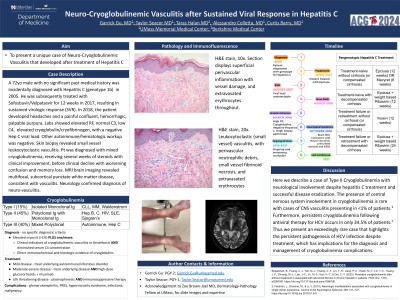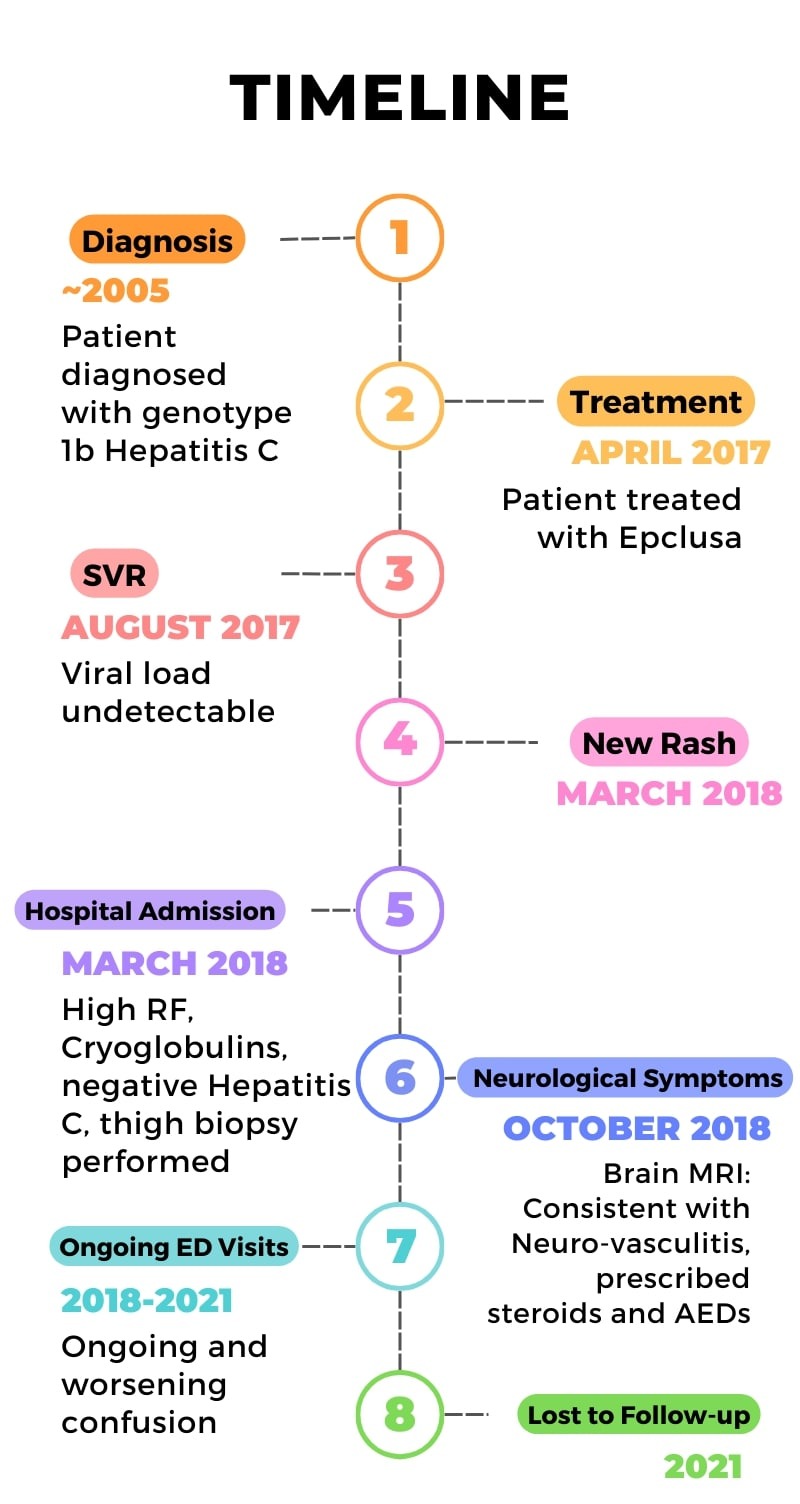Sunday Poster Session
Category: Liver
P1372 - Neuro-Cryoglobulinemic Vasculitis After Hepatitis C Treatment and Sustained Viral Response
Sunday, October 27, 2024
3:30 PM - 7:00 PM ET
Location: Exhibit Hall E

Has Audio

Garrick H. Gu, MD
University of Massachusetts
Worcester, MA
Presenting Author(s)
Garrick H. Gu, MD1, Taylor Seacor, MD2, Taras Halan, MD3, Alessandro Colletta, MD4, Curtis Barry, MD2
1University of Massachusetts, Worcester, MA; 2University of Massachusetts Memorial Medical Center, Worcester, MA; 3Berkshire Medical Center, Pittsfield, MA; 4University of Massachusetts Chan Medical School, Worcester, MA
Introduction: Cryoglobulinemic vasculitis is a rare condition that is associated commonly with malignancy, autoimmune conditions, and Hepatitis C. It results in a host of symptoms, all related to hyperviscosity and deposition of cryoglobulins. Hyperviscosity can lead to hyperviscosity syndrome, whereas deposition in small arteries leads to infarction. In Type 2 (Mixed IgM and polyclonal IgG) and 3 (Polyclonal IgM) disease, there is an additional component of complement based vasculitis, which is present in only 30% of patients. Even rarer are the severe manifestations, including cardiovascular, respiratory and neurological complications. Here we present a case of Neuro-cryoglobulinemic vasculitis resulting from Hepatitis C despite complete sustained viral response.
Case Description/Methods: 72 yo M with no significant past medical history, diagnosed in around 2005 with Hep C while doing random testing in the Air Force. Patient was treated with a course of Epclusa that started in April 2017 and finished in August 2017, with undetectable viral load during and after treatment, confirming eradication. In March of 2018, the patient developed a new painful rash on his bilateral thighs, described as confluent hemorrhagic palpable purpura, and was admitted to the hospital. Dermatology performed a thigh skin biopsy that demonstrated granular C3 within walls of dermal vessels, compatible with diagnosis of small vessel leukocytoclastic vasculitis. Hepatitis C titers were undetectable. Patient was diagnosed with mixed cryoglobulinemia, and improved with several weeks of high dose oral steroids. In the months after discharge, the patient began to exhibit poor insight, subacute development of confusion, memory loss, and abrupt decrease in executive functioning. Patient was evaluated in October 2018 by Neurology, who found that he had severe multi-domain cognitive impairment with poor insight, as well as moderate-severe peripheral neuropathy. His neurologist confirmed that his brain MRI findings were also consistent with neurological involvement of the vasculitis.
Discussion: Cryoglobulinemia is a fairly rare condition associated with Hepatitis C. This is a unique case of a patient who developed cryoglobulinemic vasculitis after full treatment of Hepatitis C, with suspected neurological involvement. A full literature search on this topic confirms the rarity of this presentation. This poster will discuss treatment, follow-up, and management of such a rare condition.

Disclosures:
Garrick H. Gu, MD1, Taylor Seacor, MD2, Taras Halan, MD3, Alessandro Colletta, MD4, Curtis Barry, MD2. P1372 - Neuro-Cryoglobulinemic Vasculitis After Hepatitis C Treatment and Sustained Viral Response, ACG 2024 Annual Scientific Meeting Abstracts. Philadelphia, PA: American College of Gastroenterology.
1University of Massachusetts, Worcester, MA; 2University of Massachusetts Memorial Medical Center, Worcester, MA; 3Berkshire Medical Center, Pittsfield, MA; 4University of Massachusetts Chan Medical School, Worcester, MA
Introduction: Cryoglobulinemic vasculitis is a rare condition that is associated commonly with malignancy, autoimmune conditions, and Hepatitis C. It results in a host of symptoms, all related to hyperviscosity and deposition of cryoglobulins. Hyperviscosity can lead to hyperviscosity syndrome, whereas deposition in small arteries leads to infarction. In Type 2 (Mixed IgM and polyclonal IgG) and 3 (Polyclonal IgM) disease, there is an additional component of complement based vasculitis, which is present in only 30% of patients. Even rarer are the severe manifestations, including cardiovascular, respiratory and neurological complications. Here we present a case of Neuro-cryoglobulinemic vasculitis resulting from Hepatitis C despite complete sustained viral response.
Case Description/Methods: 72 yo M with no significant past medical history, diagnosed in around 2005 with Hep C while doing random testing in the Air Force. Patient was treated with a course of Epclusa that started in April 2017 and finished in August 2017, with undetectable viral load during and after treatment, confirming eradication. In March of 2018, the patient developed a new painful rash on his bilateral thighs, described as confluent hemorrhagic palpable purpura, and was admitted to the hospital. Dermatology performed a thigh skin biopsy that demonstrated granular C3 within walls of dermal vessels, compatible with diagnosis of small vessel leukocytoclastic vasculitis. Hepatitis C titers were undetectable. Patient was diagnosed with mixed cryoglobulinemia, and improved with several weeks of high dose oral steroids. In the months after discharge, the patient began to exhibit poor insight, subacute development of confusion, memory loss, and abrupt decrease in executive functioning. Patient was evaluated in October 2018 by Neurology, who found that he had severe multi-domain cognitive impairment with poor insight, as well as moderate-severe peripheral neuropathy. His neurologist confirmed that his brain MRI findings were also consistent with neurological involvement of the vasculitis.
Discussion: Cryoglobulinemia is a fairly rare condition associated with Hepatitis C. This is a unique case of a patient who developed cryoglobulinemic vasculitis after full treatment of Hepatitis C, with suspected neurological involvement. A full literature search on this topic confirms the rarity of this presentation. This poster will discuss treatment, follow-up, and management of such a rare condition.

Figure: Timeline of Case Presentation
Disclosures:
Garrick Gu indicated no relevant financial relationships.
Taylor Seacor indicated no relevant financial relationships.
Taras Halan indicated no relevant financial relationships.
Alessandro Colletta indicated no relevant financial relationships.
Curtis Barry indicated no relevant financial relationships.
Garrick H. Gu, MD1, Taylor Seacor, MD2, Taras Halan, MD3, Alessandro Colletta, MD4, Curtis Barry, MD2. P1372 - Neuro-Cryoglobulinemic Vasculitis After Hepatitis C Treatment and Sustained Viral Response, ACG 2024 Annual Scientific Meeting Abstracts. Philadelphia, PA: American College of Gastroenterology.
